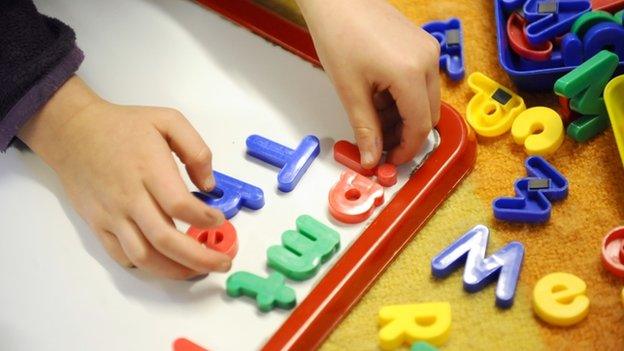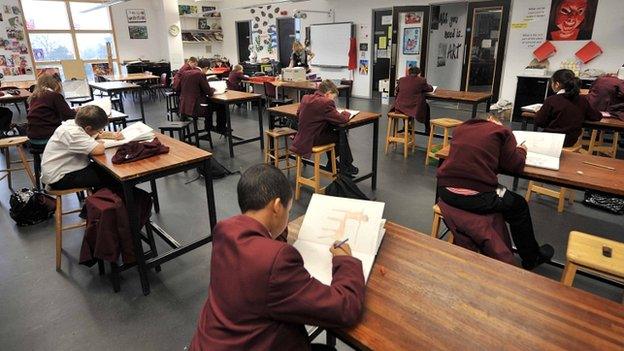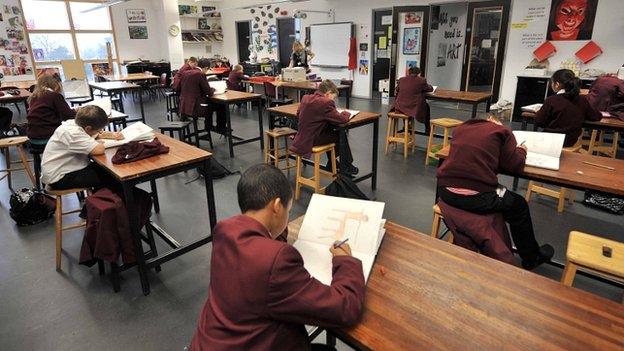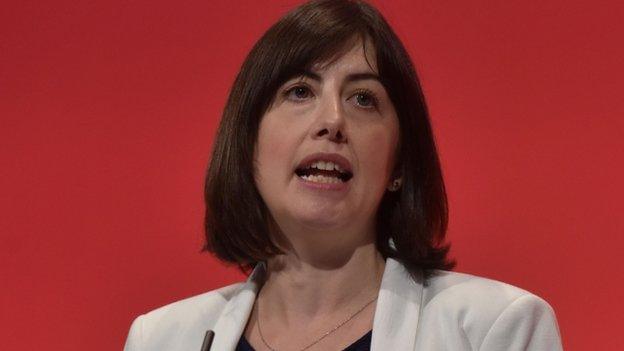Teacher shortage means pupils travel to other school
- Published

The staff shortage facing the Yorkshire primary is part of a wider national problem, say heads
Pupils in a primary school in Yorkshire will have to travel to another school for part of each day because of difficulties in recruiting a teacher.
Easington Primary Academy pupils will be driven to another school for morning lessons in literacy and numeracy.
The school said a long-term supply teacher had left earlier than expected and a replacement could not be found.
But a Department for Education spokeswoman said there was no shortage of primary school teachers.
Head teachers' organisations have been warning that a shortage of teachers has become a "crisis" for schools.
'Urgent action'
Brian Lightman, leader of the ASCL head teachers' union, said the problems facing this primary school were "symptomatic" of wider recruitment difficulties facing "head teachers all over the country".
"Urgent action needs to be taken to address this problem that is jeopardising efforts to raise standards," said Mr Lightman.
But a spokeswoman for the Department for Education said: "It is simply not true that there is a shortage of primary school teachers.
"Last year we recruited 116% of our primary target. However, we know that some schools, and particularly some rural schools, find it more difficult to recruit."
She said that the government was expanding routes into teaching such as Teach First and had launched the National Teaching Service to "send outstanding teachers into areas exactly like this".
"We expect head teachers and academy trusts to plan their staffing properly," said the DFE spokeswoman.
From this term, because the school could not find a suitable teacher, pupils in Years 5 and 6 at Easington will have to travel to Patrington Primary Academy for the morning, returning to their own school after lunch.
Preparing for tests
Patrington and Easington are part of the same academy trust and share an executive head teacher.
A statement from the trust said:
Easington had been unable to find a permanent replacement for a teacher who had left last summer
The supply teacher brought in as a temporary replacement had now also left
Supply agencies had been unable to provide another suitable replacement
"A great deal of thought has gone into how the academy can best meet the needs of the pupils, especially for Year 6 pupils who will be taking Sats [national curriculum tests] in May," said the William Temple Academy Trust.

Heads have warned MPs that teacher recruitment is now a "crisis"
"We recognise that this means more change for the Easington Years 5 and 6, but we have no option.
"We hope that being taught by the class teachers at Patrington will provide more consistency for the pupils than a succession of supply teachers for a couple of weeks at a time."
A meeting for parents to discuss how the arrangement is working is planned for later this month.
Labour's shadow education secretary Lucy Powell said: "Whilst ministers continue to bury their heads in the sand over teacher shortages, we are seeing more and more evidence that this serious issue is threatening standards."
Ms Powell accused the government of denying there was a problem with recruitment, "despite the fact that half of all schools had unfilled positions at the start of this academic year and some pupils are now having to travel to other schools for their maths and English lessons".
National Union of Teachers' leader Christine Blower said recruitment problems were "of the government's own making" and warned that they could get worse.
"Failure to address excessive and often pointless workload alongside low and unpredictable pay have resulted in a huge number of teachers considering leaving the profession while new graduates are choosing other more attractive career options."
Last month, head teachers warned MPs on the Education Select Committee of a deepening "crisis" in recruiting and retaining teachers.
The National Association of Head Teachers said 59% of schools advertising for teachers "struggled" to get applicants and a further 20% failed completely to appoint anyone.
Teachers' recruitment expert Prof John Howson told the MPs the current teacher shortage was the worst since 2001-02.
- Published9 December 2015

- Published14 December 2015

- Published9 December 2015